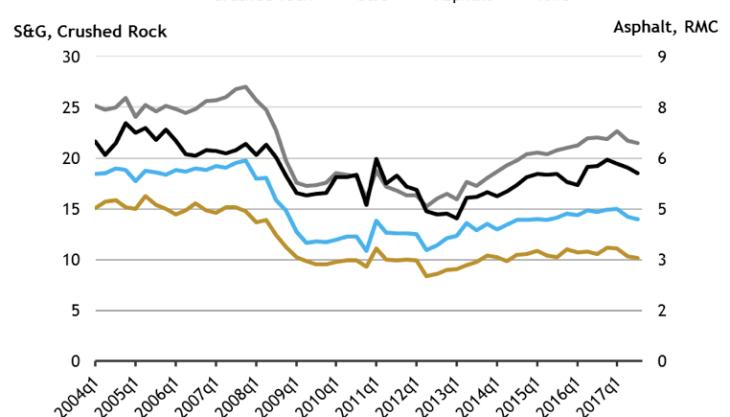MPA statistics reveal a mixed picture

Third-quarter demand for mineral products shows mixed trends in construction activity
DEMAND for construction mineral products was lower in the third quarter (Q3) of 2017 than both the previous quarter and Q3 2016 across all materials except for mortar, according to the latest quarterly industry statistics produced by the Minerals Products Association (MPA).
Demand for mortar increased by 1.6% in Q3 2017 compared with the previous quarter, but sales volumes were down by 1.1% for aggregates, 1.8% for ready-mixed concrete and 2.9% for asphalt. This is the second consecutive quarter of decline for both aggregates and ready-mixed concrete, and the third for asphalt.
The MPA says weaker trend in mineral products sales provides evidence of further weakening in general construction activity in recent months, and corroborates messages highlighted in other data sources, including from the Office for National Statistics (ONS).
Taking a longer-term view, the pattern of demand for mineral products this year so far also suggests that there is more than one trend within construction activity.
Sales volumes for the first three quarters of 2017 were positive for both mortar and asphalt, up 10.5% and 2.3%, respectively, compared with the same period in 2016, whilst aggregates remained flat and ready-mixed concrete declined by 1.9%.
Mortar sales show that construction activity is heavily skewed toward house building, whilst asphalt sales are being supported by road activity in England that is partially offsetting declines in Scotland. Meanwhile, continued reductions in ready-mixed concrete sales, notably in London, point to emerging weaknesses in commercial office building work.
Looking forward, slower economic and construction growth expected for next year will drag on mineral products sales. Muted activity alongside weaker sales volumes in the past six months and a degree of uncertainty on the timing of delivery for roads and major infrastructure projects means that aggregates and ready-mixed concrete markets are expected to remain flat during 2017–19, with marginal growth for asphalt.
Mortar sales, however, should continue to grow steadily reflecting continued momentum in house building.
Aurelie Delannoy, chief economist at MPA, commented: ‘Two consecutive quarters of weakening demand for mineral products confirm the general slowdown in construction, despite the strong growth seen in house building.
‘Domestic pressures on commercial and industrial construction means that businesses are now very much looking forward to a boost from planned infrastructure projects, with work expected to gather pace on the Thames Tideway Tunnel, Hinkley Point C and Highways England’s road programme, and the start of HS2 next year.
‘Delivery and the pace of delivery on these projects is crucial; without them, the prospects for mineral products producers and the wider construction industry could be more negative.’
Ms Delannoy continued: ‘The Chancellor will have the opportunity during the Autumn Budget this month to address some of the issues. A focus on policy measures to boost business confidence and investment, whilst alleviating concerns over the outcome of the Brexit negotiations, would support domestic economic activity, including construction.
‘In addition, there is also an opportunity to speed-up the delivery of infrastructure projects, including Highways England investment which, to date, remains heavily backloaded toward the end of the five-year 2019–20 Road Investment Strategy period and beyond.’









